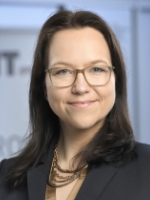Alloy and process development with a focus on aluminium and magnesium
The LKR Leichtmetallkompetenzzentrum Ranshofen is bundling its know-how with 12 project partners from industry and science and develops new aluminium and magnesium alloys for future industrial applications.
The use of light metals instead of steel is one of the fastest growing key trends in the aerospace and automotive industry. The enormous weight reduction has a positive effect on the energy efficiency and CO2 emissions of aircraft and vehicles. The light metals aluminium and magnesium are particularly interesting because of their lightness and high stability. At the same time, however, they must be strong, corrosion-resistant, weldable, castable or formable, i.e. they must combine several, sometimes contradictory properties.
To make these materials fit for future industrial applications, the LKR Leichtmetallkompetenzzentrum Ranshofen is pooling its know-how with 12 project partners from industry and science. LKR scientists Dr Stephan Ucsnik and Dr Carina Schlögl are coordinating the AMALFI project, which is funded by FFG and the state of Upper Austria. Together with an interdisciplinary team of researchers, they will research and further develop novel aluminium and magnesium alloys, taking into account different manufacturing and processing chains.
Alloy and process development with a focus on aluminium and magnesium
With a view to new requirements for materials, processes and technologies, the alloys and processing methods developed in the predecessor COMET project AMOREE will receive a technological boost within the framework of AMALFI in order to be prepared for industrial applications of the future.
For the field of aluminium, this means specifically:
- increasing the crashworthiness of aluminium extrusions,
- the process optimisation of direct chill casting of critical aluminium alloys (tooling technologies, cooling technologies) incl. high-quality ingots for subsequent high-performance extrusion profiles or direct forging,
- the development of novel roll forming/bending processes for multifunctional profiles for innovative, high-performance, competitive Al components
The magnesium key areas of the project are:
- the further development of flame-retardant Mg alloys for the aviation of the future, with a high-performance, mechanical property profile at low material and process costs,
- the processing of the new Mg alloys in processes such as continuous casting, forging or thixomoudling
Strategic focus for the future
The AMALFI consortium is also dedicated to a topic area of basic research: the development of novel microstructure and microstructure models for aluminium and magnesium alloys. "These models are important because they have the potential to decisively advance the development of future Al and Mg alloys, especially through virtual, numerical simulation," explains Dr Stephan Ucsnik from the LKR.



